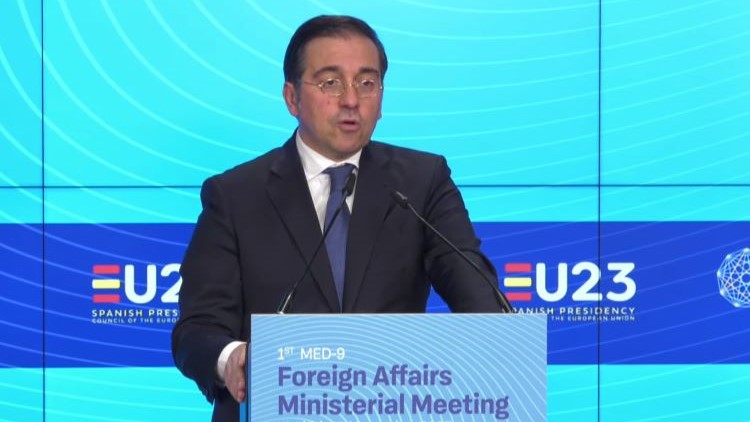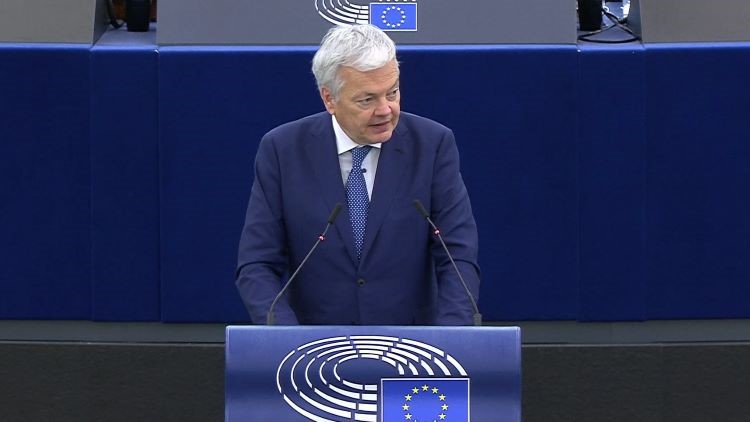Eduardo González
The Minister of Foreign Affairs, José Manuel Albares, celebrated yesterday the agreement between Israel and Hamas for the release of Israeli hostages and the declaration of a humanitarian truce in the Gaza Strip, while avoiding advancing any date for the recognition of the Palestinian State, announced by the President of the Government, Pedro Sánchez, during the investiture debate.
“We celebrate the agreement for the release of hostages and the humanitarian truce in Gaza,” stated José Manuel Albares through his official account on the social network X. “All hostages must be released and the Palestinian civilian population protected,” he continued. “Spain is ready to help. We work for a Peace Summit that materializes in two States,” added the minister, who will appear next December 5 before the plenary session of the Congress of Deputies, at the request of the PP, to report on the Gaza war.
In the same vein, Pedro Sánchez yesterday showed his “satisfaction” for the agreement and insisted, during his intervention by videoconference at the G20 leaders’ summit, on the need to “put an end to the humanitarian crisis in Gaza” through the two-state solution and reiterated the Spanish proposal for an international peace conference “as soon as possible”.
Later, during a press conference at the Ministry’s headquarters in Madrid after the first Ministerial Meeting of Foreign Ministers of the Mediterranean countries (Med-9), Albares again referred to the peace conference to dodge a question about when the Government will fulfill Pedro Sánchez’s commitment to recognize the Palestinian State.
“It is one of the issues that we have dealt with today, the recognition of the Palestinian State, and around the table there was a consensus that what we had to do is that those of us, as is the Spanish case, who are clearly committed to the recognition of the State of Palestine, because it is fair for the Palestinians, because it guarantees stability for the Middle East and because it is also the best way to guarantee security for the State of Israel, we agree among ourselves, we talk about it and we do it in a way that is intelligent in the sense that it favors peace and stability,” he stated.
“We all know what the solution is, the formula is there and has been accepted by Israelis and Palestinians, and that is the approach that we take not only ourselves, but the majority of Europeans who are willing to take that step: a peace conference from which the materialization of that two-state solution, a state of Palestine and a state of Israel that recognize each other, will clearly emerge,” he added.
The minister also dodged as best he could a question about Sumar’s two new ministers – Pablo Bustinduy and Sira Rego – who took advantage of the act of collecting ministerial portfolios to denounce Israel’s actions in Gaza. “All the partners and allies of the world know perfectly well the Spanish position”, manifested in the support to the sending of humanitarian aid to Gaza and in “the peace conference, a Spanish idea that has become European after the last European Council and that has been endorsed by the Arab League”, he affirmed. “Everyone knows our position”, he reiterated, without further comment.
Sánchez’s trip to the Middle East
The Middle East conflict escalated considerably on February 7 following the Hamas terrorist attacks against Israel and the subsequent Israeli military response against the Gaza Strip. The agreement between Israel and Hamas provides for the release of fifty hostages held by the Islamist group in Gaza and a four-day halt to Israeli ground and air attacks on the Strip.
The news of the cease-fire comes on the eve of Pedro Sánchez’s tour of the Middle East accompanied by the Prime Minister of Belgium, Alexander de Croo. Sánchez and De Croo will be received today, Thursday, in Jerusalem by the President and Prime Minister of Israel, Isaac Herzog and Benjamin Netanyahu, and in Ramallah by the President of the Palestinian National Authority, Mahmoud Abbas. On Friday, they will meet in Cairo with the President of Egypt, Abdel Fatah al Sisi, and with the Secretary General of the Arab League, Ahmed Abul Gheit.
According to Moncloa’s official account on the social network X, the talks will focus “on the protection of all civilians, the unconditional and immediate release of the hostages, the access of humanitarian aid to the Gaza Strip and the search for a solution based on two States coexisting in peace and security”. Spain currently holds the rotating Presidency of the Council of the EU and Belgium will begin to do so on January 1, so the objective of the visit of Sanchez and De Croo is to convey the position of the European Union to the leaders of Israel and Palestine.
Despite holding the Presidency of the EU, Sanchez has waited more than a month and a half to travel to the area. During this period, the region was visited by several Western leaders, including some of the top leaders of the EU, such as the President of the Commission, Ursula von der Leyen; the President of the European Parliament, Roberta Metsola; or the High Representative for Foreign and Security Policy, Josep Borrell.
On October 26, the President of the Government proposed to the European Council the holding of an international peace conference for the Middle East so that “the entire international community feels involved” in favor of the two-state solution. Finally, the 27 agreed, in their final declaration, to “reactivate a political process based on the two-state solution” and showed “their support for the early holding of an international peace conference”, without further details.







